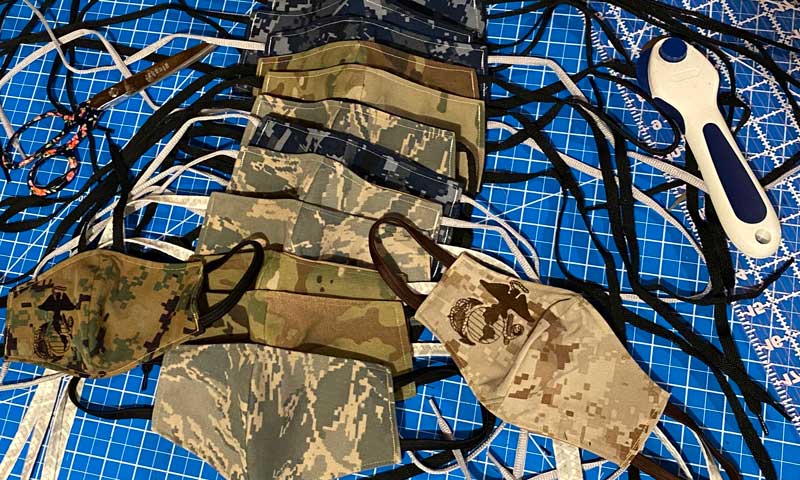In the midst of a pandemic, with social distancing and empty streets becoming the norm, Amber Gallagher is doing her part to help flatten the curve by making cloth facemasks for the community and friends around the world. Since April 4, she has made nearly 1,000 masks and has increased production to about 100 masks a day.
Gallagher is using a stockpile of fabrics she had collected during her seven years overseas while her husband, U.S. Marine Corps Capt. Patrick Gallagher, currently an NPS student, was stationed in Bahrain and Okinawa.
“I always feel amazing when we finish up a batch,” said Gallagher. “I get excited to package it up and message the recipient. Yesterday, I finished up a batch of 89 masks, with a portion of those going to the local neighborhood and some being mailed to military friends around the world. In a few days, 13 different families around the world will be getting a package with masks and it makes me feel so proud and useful.
“During these uncertain times, it’s hard not to feel helpless and unsure of what is to come so I wanted to find a way to help … And this is how we help,” she continued.
With masks in short supply, Gallagher wanted to transform her large, but quickly dwindling collection of fabric into something that could help people get through this time. While making masks with a variety of patterns and designs for civilians, she is also using donated military uniforms to make masks.
“They are reporting for duty and should have something that honors their service the same way their uniform does,” claimed Gallagher, who is happy to accept donated uniforms no longer in use.
Initially, Gallagher started making masks by herself with her husband quickly jumping in to help by cutting patterns and ironing. But after a few days, he wanted to learn to make one, and after a quick tutorial the team expanded. Gallagher was loaned a second sewing machine and enlisted the help of her two children to help cut shoelaces and turn masks inside out, which is the second to last step in the creation process. Along with her family, Gallagher has received help ironing bias tape to make colorful straps for the civilian masks.
“After cutting the strips of fabric for them and putting them in a bag on my porch, they pick up the bags of fabric and iron them into bias tape and drop it back off to me so I can make it into straps,” explained Gallagher, noting that this process can be very time-consuming and allows her to focus on other parts of making the masks with the help of Liz Dawson, Nancy Pittaluga, and Kristen Sagerholm.
With all of the fabrics Gallagher already had were “fun, colorful and funky” there was almost no fabric that fit the military face covering requirements. She reached out to the community via the ‘La Mesa Community’ Facebook page people started dropping off old uniforms on her porch. The dress uniforms are the essential “plain” fabric needed as every mask made is reversible with the various branch working uniform patterns on one side and the plain color dress uniform fabric on the reverse side.
“We just want to help people stay safe, stop the spread, flatten the curve, and hopefully make people feel happy with the mask they have,” she continued.
Gallagher’s masks have been donated to military units at the Presidio of Monterey, Defense Language Institute Foreign Language Center and NPS, as well as 61 families in the local community. She hopes to expand the distribution to communities outside of the immediate area.


